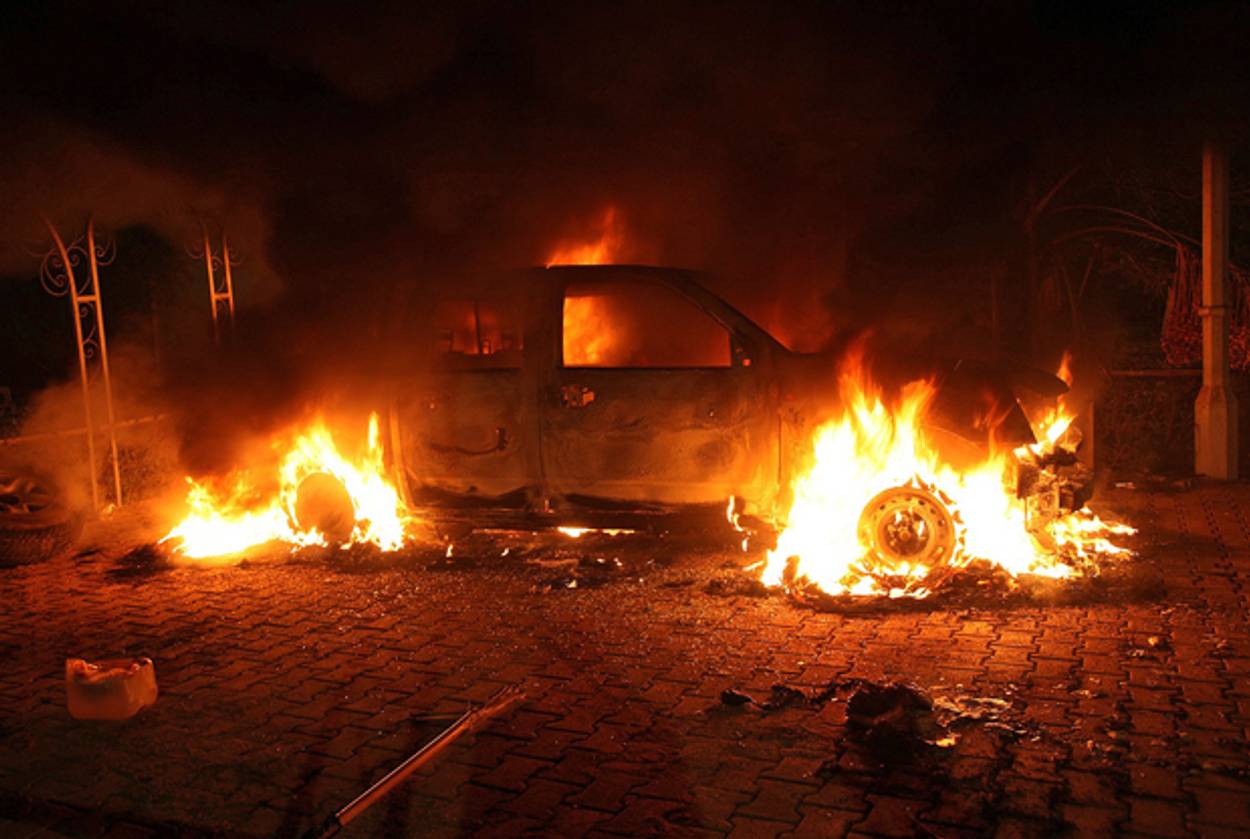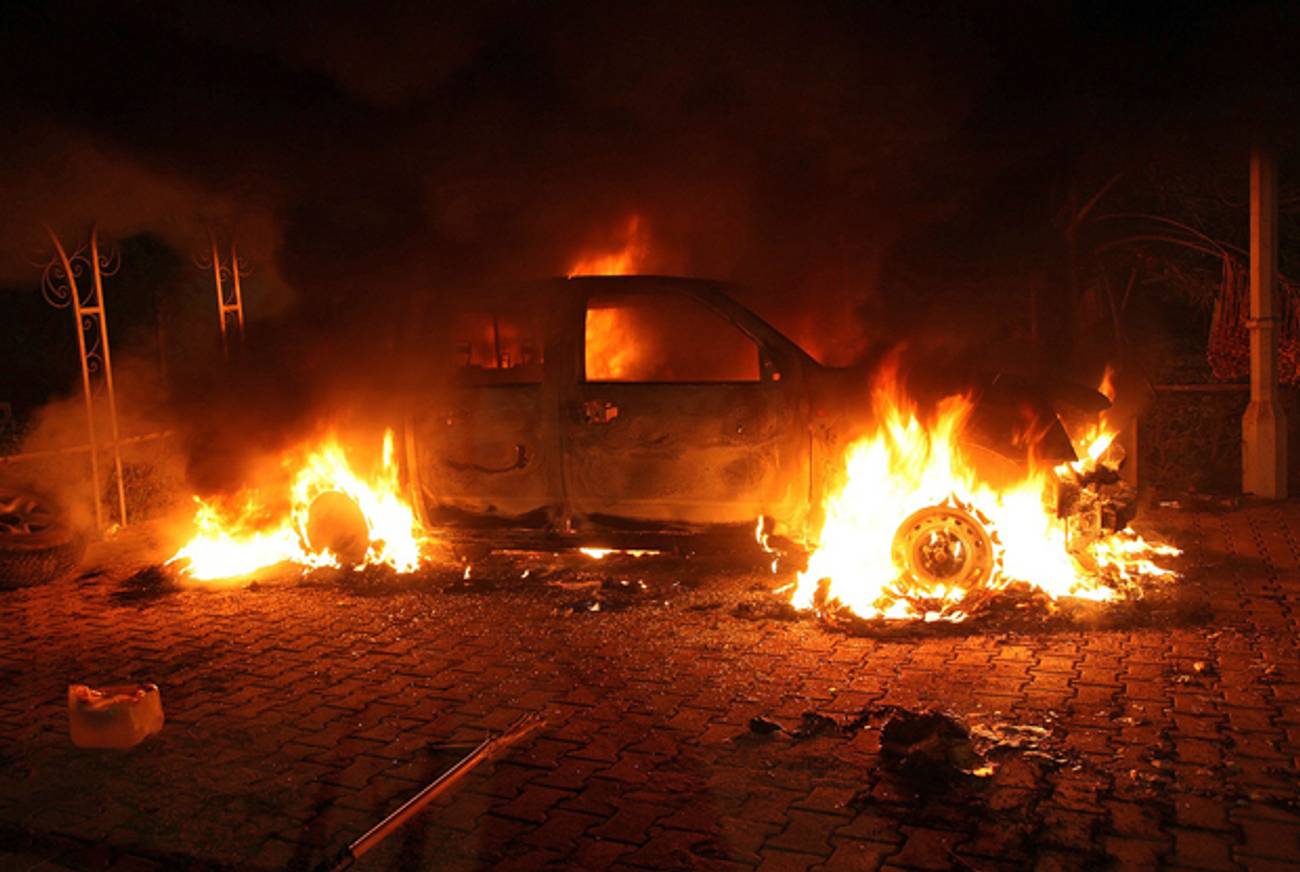A Pretext to Murder in Libya
Don’t blame a YouTube movie for ‘inciting’ the mob that killed the U.S. ambassador. Blame the killers.




People used to talk a lot about the world before and after Sept. 11. As in, back before the deadly attacks on that morning in 2001, we operated under a set of naive assumptions about national security, Islamic radicalism, and worst-case scenarios on American soil. And afterward, depending on your point of view, we adapted or overreacted to our cruel new reality.
Well, a similar bifurcation may be appropriate for Sept. 11 and 12 of 2012. On that first day, it still seemed reasonable to enough people in the U.S. embassy in Cairo to preemptively denounce an anti-Islam YouTube video in order to stave off a growing mob of angry Islamists. A press release issued by the embassy that morning condemned the “continuing efforts by misguided individuals to hurt the religious feelings of Muslims,” in an effort to forestall potential violence from the Islamist mob. But by Day 2, the Islamist mob had ransacked the embassy in question, pulled down (and tried to burn) the American flag, and replaced it with a black banner that read, “There is no god but Allah and Muhammad is his prophet.”
As one of the Cairo protesters, Mohammad al-Zawahiri, the brother of al-Qaida chief Ayman al-Zawahiri, reportedly explained: The U.S. government’s statement condemning the producers of the video that insults the Prophet was not enough. Neither prophylactic apologies nor self-censorship, it turns out, seem to mollify religious fanatics.
Not that many in America’s political class seem to notice. It’s a modern marvel to witness how thoroughly the country’s journalists and commentators have, over the past decade, internalized false notions about Muslims, violence, and free expression. For instance, that depicting the historical figure of Muhammad is untenable blasphemy (see the Muhammad Image Archive for a repository of rejoinders); that the mere discussion about the proposed portrayal of a cartoon Muhammad bear-suit should be avoided at all costs in order to avoid a potential spasm of Mideast violence; and that retreating so abjectly from the defense of free speech will somehow make the world a safer place.
No, American writers, reporters, and artists won’t touch the Prophet Muhammad with a 10-foot pair of kid gloves. Provocateurs who luxuriate in the death of God leave Allah the hell alone. Western countries without a First Amendment prosecute “blasphemers.” Even free-speech heroes like Penn Jillette will acknowledge that his act won’t tackle Islam “because we have families.” An alt-weekly cartoonist felt impelled to go into the witness protection program in order to avoid retribution from murderous Islamists unsatisfied with her apology for proposing an “Everybody Draw Mohammed Day.” Meantime, professional free-speech organizations say little.
So, it shouldn’t come as a great surprise that now, after Tuesday night’s savage murder of four Americans in Libya, including Ambassador J. Christopher Stevens, a sector of the American commentariat is calling for the heads of … lunatic Florida Pastor Terry Jones and a bizarro-world filmmaker who goes by the names Sam Bacile and Nakoula Basseley Nakoula. Some of them seemed to go so far as to agree with Mohammad al-Zawahiri that “the filmmakers should be arrested and brought to trial.”
University of Pennsylvania Associate Professor of Religious Studies Anthea Butler, for example, tweeted: “How soon is Sam Bacile going to be in jail folks? I need him to go now. When Americans die because you are stupid …”
In the Huffington Post, Rev. Steven D. Martin crossed the line from moral equivalence to moral imbalance. “I have no sympathy for anyone who would assassinate a U.S. ambassador,” Martin wrote. “But I have even less sympathy for filmmakers who spread hatred and for pastors who knowingly incite violence.”
Many journalists and news outlets asserted the same “incitement” charge as fact. “YouTube blocks video inciting violence” in the Middle East, wrote the Associated Press, in a headline reprinted at the Washington Post, FoxNews.com, Boston.com, and elsewhere.
It may sound evasive to reject the “incitement” accusation leveled at filmmakers who fully expected that their work might provoke just such a reaction. But there is a critical distinction between kindling and spark. The former is in limitless supply, usually lying dormant—as the Danish cartoons of Muhammad were for several months before imams found them useful for propaganda purposes. Whipping up the crowd in front of you to commit acts of violence is the M.O. of people like al-Zawahiri, not those whose bad art offends him.
The difference between artistic provocation and pugilistic organization is lost on many, leading to a grossly inaccurate intellectual shortcut best summed up in an Atlantic headline: “Sam Bacile: The Mysterious Filmmaker Who Set the Muslim World on Fire.” Or as Ambassador Stevens’ friend-of-a-friend Farah Stockman put it at the Boston Globe, “How could Chris Stevens die because of a YouTube clip?”
“Shouldn’t people who knowingly incite violence against the United States—as a crude, thinly-veiled publicity stunt—also be held accountable?” Stockman asked. “I can’t think of a time when the reckless actions of a few private citizens have cost us so much—in American lives, tax dollars and credibility around the world.”
Or not. The New York Times and other outlets are now reporting that U.S. intelligence suspects that the deadly attacks on the consulate in Libya were likely planned, with outrage over the video used “as a cover for their attack.” Getting into the heads of the homocidal is more difficult than it seems at first glance.
Which is ultimately why the embassy’s pre-emptive apology for private speech is so self-defeating. Not only are you encouraging the easily offended to lower their outrage bar still further—and thus perpetuating the cycle of stifled speech in the free and democratic West—you are reinforcing the pernicious idea that expression in the United States is sanctioned by the government until stated otherwise.
In fact, it is precisely in our proclivity for free-wheeling offense that America’s free-speech tradition becomes an irresistible magnet for those who live in the kinds of stifling societies where the government really does regulate expression. As a Romanian rapper once told me about N.W.A., listening to “Fuck tha Police” convinced him that America really was a free country. Many participants in the Arab Spring were using new media for that most familiar of reasons: access to porn. Even one of the Cairo rioters was reportedly wearing a V for Vendetta cap, though clearly this is open to multiple interpretations.
I do not begrudge Farah Stockman or anyone else their grief at losing a friend and fellow citizen. But when she writes that “one great downside of the First Amendment is that the inner thoughts of our stupidest citizens are put on display for the whole world to see,” I say she has it exactly backward. America is so free that even the dullards despised by their own government have access to expression and distribution, as long as it doesn’t involve ransacking embassies or firing rocket launchers into compounds. That there are expressive alternatives to violence may be the best American advertisement of all.
***
Like this article? Sign up for our Daily Digest to get Tablet Magazine’s new content in your inbox each morning.
Matt Welch is the editor in chief of Reason and co-author of The Declaration of Independents: How Libertarian Politics Can Fix What’s Wrong With America.
Matt Welch is the editor in chief of Reason and co-author ofThe Declaration of Independents: How Libertarian Politics Can Fix What’s Wrong With America.